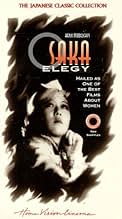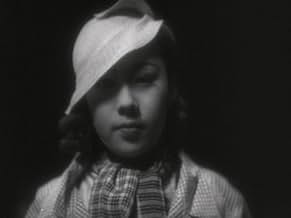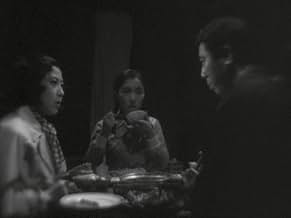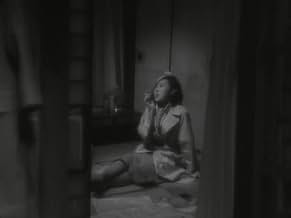NOTE IMDb
7,2/10
2,7 k
MA NOTE
Une jeune femme devient la maîtresse de son patron pour pouvoir subvenir aux besoins de sa famille.Une jeune femme devient la maîtresse de son patron pour pouvoir subvenir aux besoins de sa famille.Une jeune femme devient la maîtresse de son patron pour pouvoir subvenir aux besoins de sa famille.
- Réalisation
- Scénario
- Casting principal
Avis à la une
This is the first collaboration between Mizoguchi and writer Yoshikata Yoda, with the actress Isuzu Yamada in the principal role, as a young telephonist pushed to prostitution to save her ruined family, and then repudiated by them. Mizoguchi begins his impressive mastership with the framing and the perspective and, though still far from his masterpieces, is an interesting milestone for the Mizoguchi admirers.
10Gonzo-23
It was this film alone that drove me into an intense obsession with cinema. Mizoguchi is the great Japanese master, and Osaka Elegy reveals his genius. From his long take compositions that are taxed with complexity and tension, to his ambigious depictions of character, I felt like I had grown after I had seen this film. Notice the national allegory at the film's conclusion, a confused and lonely Japan. And his inconclusive final shot taken many years before the well known 400 Blows. The devastating melodrama is not undercut by any cinematic manipulation. I highly recommend this to any lover of the cinematic medium. Also, I am a sucker for self-reflexive Kabuki theater sequences...
I believe the challenge here was to conceive of a film in terms of bunraku - the traditional Japanese puppet theater - and extrapolate from the environment a structure, so one stage where heightened drama unfolds, controlled, with a view of the mechanisms handling the illusion, and then a second stage on the side to supply a rotation of music and voice expressing emotion. This is very well thought out, something to keep in mind when viewing later Mizoguchi where melodrama lacks annotation.
This translates in our film as melodrama about a bold young woman who gambles away on her dignity and reputation because the world around her is desperate for either money or sex, the controlling mechanism is that only the viewer is in possession of all the facts and so is able to read tragic fate in every exchange. This has been noted by some viewers as film noir, because the woman appears to function as a femme fatale, but the Japanese have no affinity for this sort of trope.
So of course, in accordance with bunraku, the woman is a puppeteer but also herself a puppet, a figure on the same stage as the play she enacts, her movements subject to our scrutiny. You will note this in tandem with, and reversing, an earlier Mizoguchi - The Water Magician - about a water artist whose life is merged with the transitory flows she used to control.
This is beautifully rendered in a scene where she is caught with her boss on a night out to watch a bunraku play. She has set a plot in motion, attempting control, an active role, but unpredictable life foils her. The wife demands explanations but seems the most irate for noticing the hairstyle on the girl, signifying a married woman, her role on the stage being supplanted even though it's a loveless marriage and thankless role. Moments before, however, we have seen an excerpt from the play, where inside the artifice, the controlled fiction, it was the suspicious husband accusing the woman of adultery.
This would have an ordinary ironic effect if mapped cleanly to the situation outside the stage, but it doesn't, it's wholly asymmetrical, the tension all in the imbalance of familiar elements framed askew. You have to puzzle about assigning to the players the puppet-master's controls. This is the touch lacking in Ozu's Floating Weeds.
The music is not in the emotional after-effects of storytelling, this too part of the heightened artifice. The music is in the camera, caressing day from night.
This translates in our film as melodrama about a bold young woman who gambles away on her dignity and reputation because the world around her is desperate for either money or sex, the controlling mechanism is that only the viewer is in possession of all the facts and so is able to read tragic fate in every exchange. This has been noted by some viewers as film noir, because the woman appears to function as a femme fatale, but the Japanese have no affinity for this sort of trope.
So of course, in accordance with bunraku, the woman is a puppeteer but also herself a puppet, a figure on the same stage as the play she enacts, her movements subject to our scrutiny. You will note this in tandem with, and reversing, an earlier Mizoguchi - The Water Magician - about a water artist whose life is merged with the transitory flows she used to control.
This is beautifully rendered in a scene where she is caught with her boss on a night out to watch a bunraku play. She has set a plot in motion, attempting control, an active role, but unpredictable life foils her. The wife demands explanations but seems the most irate for noticing the hairstyle on the girl, signifying a married woman, her role on the stage being supplanted even though it's a loveless marriage and thankless role. Moments before, however, we have seen an excerpt from the play, where inside the artifice, the controlled fiction, it was the suspicious husband accusing the woman of adultery.
This would have an ordinary ironic effect if mapped cleanly to the situation outside the stage, but it doesn't, it's wholly asymmetrical, the tension all in the imbalance of familiar elements framed askew. You have to puzzle about assigning to the players the puppet-master's controls. This is the touch lacking in Ozu's Floating Weeds.
The music is not in the emotional after-effects of storytelling, this too part of the heightened artifice. The music is in the camera, caressing day from night.
...with a plot out of Precode Hollywood and frequent jazz music to match. A pretty young switchboard operator reluctantly decides to become the mistress of her boss so she can help her financially-strapped father who had embezzled company funds for an investment that went bad, and her college-student brother who needs his tuition paid. Of course she is ostracized from the family for her immorality without giving her the chance to explain how they got their money. Various other relationships and subplots also come into play. This one has nicely-plotted character dynamics, good performances, and beautiful cinematography.
An exceptional film in that it redefines that cinematic, to a degree literary, trope, the femme-fatal. In this film we watch from her perspective. Her transgressions seem themselves a kind of victimization. Not only is sexuality the only tool a woman is given to empower herself in society, but her dignity and her sexuality are therefor put in an antagonistic relation to each other. Sexuality and sincerity become mutually exclusive in the world Mizoguchi paints. The cinematography is magnificent. Everyone looks compromised. But the last shot lets us know which victim's compromise cuts the deepest and. A feminist work in the most profound sense.
Le saviez-vous
- Citations
Junzo Murai: You're a woman... Being taken to the police station... Getting thrown into jail... You've done shameful things. You ungrateful child!
Ayako Murai: How could you say that? I never expected that I'd be treated like this when I came home. This is ridiculous! I thought you would welcome me with open arms. If I'd have known this, I never would have come back.
- ConnexionsFeatured in Century of Cinema: Un siècle de cinéma japonais, par Nagisa Oshima (1995)
Meilleurs choix
Connectez-vous pour évaluer et suivre la liste de favoris afin de recevoir des recommandations personnalisées
- How long is Osaka Elegy?Alimenté par Alexa
Détails
- Durée
- 1h 11min(71 min)
- Couleur
- Mixage
- Rapport de forme
- 1.37 : 1
Contribuer à cette page
Suggérer une modification ou ajouter du contenu manquant























